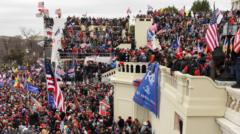Derrick Evans, a participant in the January 6 Capitol riots, expresses hope for a presidential pardon from Donald Trump after the 2024 election. Despite Trump's ambiguous statements on clemency for rioters, anticipation is palpable among those charged. Experts warn such pardons could undermine the justice system and embolden political violence.
January 6 Rioters Hope for Pardon from Trump During 2024 Campaign

January 6 Rioters Hope for Pardon from Trump During 2024 Campaign
Derrick Evans, a former West Virginia lawmaker, and other January 6 Capitol rioters anticipate pardons from Donald Trump, who has promised clemency if re-elected.
As the 2024 presidential campaign unfolds, many participants of the January 6 Capitol riot are looking towards Donald Trump for a possible pardon. Derrick Evans, a former member of the West Virginia legislature and one of the rioters, believes that a pardon would drastically change his life post-incarceration. Evans, who had pleaded guilty to civil disorder and served three months in federal prison, feels confident in Trump's repeated claims that he would consider pardoning those who participated in the Capitol storming.
Trump has openly referred to the rioters as “patriots” and "political prisoners," solidifying the hope within this group that their legal troubles might soon come to an end should he retake the presidency. In March, he declared on social media that he would make it a priority to free what he termed the “January 6 Hostages." However, Trump has also mentioned a case-by-case review for the rioters, creating uncertainty about who would ultimately receive pardons and when they would occur.
The fallout from the Capitol riot continues to be significant. Close to 600 individuals have faced charges related to the event, with investigations still ongoing. The federal government has been pursuing what it deems “egregious” cases even as Trump’s potential return to the White House raises questions about the investigation's future. Some rioters, like Christopher Carnell, have already delayed their legal proceedings while anticipating possible clemency, leading to frustrations among victims and legal experts.
The excitement among rioters is matched by concern from anti-extremism advocates. Wendy Via, co-founder of the Global Project Against Hate and Extremism, notes a growing sentiment among rioters who are rallying online, referring to their fellow participants as political prisoners. The Proud Boys, a key group within the January 6 attacks, have even encouraged members to stay incognito during Trump’s inauguration to celebrate their anticipated pardons from safety.
While the prospect of widespread pardons remains unlikely, the idea lingers in the minds of those like Evans, who suggest that mere pardons may not suffice to atone for their prison time and have called for reparations as well. Critics warn that pardoning these individuals could send a dangerous message that political violence is acceptable. The true implications of Trump’s potential clemency remain to be seen as America approaches a pivotal election year.




















